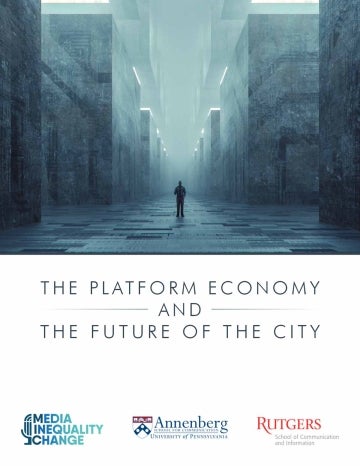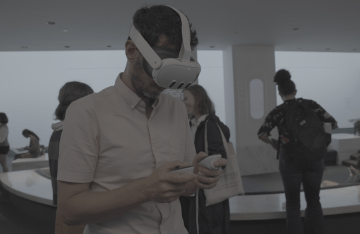MIC Center Releases “The Platform Economy and the Future of the City” Report
Philadelphia is in a unique position to become proactive on issues surrounding the platform economy.

The Media, Inequality & Change (MIC) Center is pleased to release its newest report, entitled "The Platform Economy and the Future of the City."
Digital technologies are transforming our cities — changing the ways that passengers and goods move and services are provided. They hold out the hope of numerous benefits for consumers by making transactions more efficient while increasing accessibility, variety, and convenience. However, these positive outcomes are unlikely to be realized without the right policies in place to guide their development and adoption.
Numerous debates have arisen over how to ensure that the costs and benefits of new technologies are distributed equitably. Many of these debates, like the most obvious immediate impacts, are happening at the local level, particularly in larger cities. By learning from other cities’ strategies and policies, Philadelphia is in a unique position to become proactive on issues surrounding the platform economy.
The MIC Center held a convening in March 2019 to explore ways to engage platform companies and balance the demands of consumers, workers, and tech innovators. Written by alumnus Aaron Shapiro (Ph.D. '18), MIC Center co-director Todd Wolfson, MIC Center program manager Briar Smith, and MIC Center affiliate Steve Viscelli, the report summarizes key themes that emerged from the convening and makes recommendations for how Philadelphia can maximize the benefits of the platform economy for all.

The recommendations include:
- Establish a platform economy research consortium.
- Enhance stakeholder engagement in the platform economy.
- Develop a platform economy code of conduct and bill of rights.
- Develop a platform economy consumer education campaign.
- Establish a regional platform worker center.
- Establish a U.S. data protection regulation.
- Develop a rating system for work on digital platforms.
- Extend worker information exchange to the U.S. and beyond.
Download a copy of the report here.
About the MIC Center
The Media, Inequality & Change (MIC) Center is a collaboration between the University of Pennsylvania’s Annenberg School and Rutgers University’s School of Communication and Information. The MIC Center explores the intersections between media, democracy, technology, policy, and social justice. It produces engaged research and analysis while collaborating with community leaders to help support activist initiatives and policy interventions. The MIC Center’s objective is to develop a local-to-national strategy that focuses on communication issues important to local communities and social movements in the region, while also addressing how these local issues intersect with national and international policy challenges.



